The Final Tally
As Greece did when it hosted the 2004 Olympics, China has won the DFL race. With 14 last-place finishes in the sports I was able to award them in,1 they had six more than the nearest competition, Canada. This is the post in which I explain what this all means.
First, it means nothing. Despite what I predicted, the DFL race has nothing to do with a country's athletic strength. China may have had more last-place finishes than anyone else, but, with 51 gold medals, they also had more first-place finishes than anyone else.
Which brings me to my second point: large delegations lead the last-place standings. With the top 13 countries having at least four last-place finishes, a country with only three athletes will obviously not crack the top 10. The smallest delegation in the top 10 was Egypt's, with 104 athletes; the smallest in the top 20 was Honduras's, with 28. But the top five were either above 300 athletes or within 20 of that number. Small delegations did have some interesting results, though: São Tomé and Príncipe had three athletes and two DFLs; the Cook Islands, San Marino, the British Virgin Islands and Somalia had a 50 percent DFL rate with only two or three athletes. But, as I argued four years ago, better that these countries send athletes to come in last than not send any athletes at all.
Then there's the African team disadvantage: in team sports with continental qualifiers, there will usually be a spot reserved for Africa, which for any number of reasons is not as competitive. The end result is that countries like Angola, Egypt or Mali just get killed in competitions like basketball, field hockey, water polo, and the relay events in swimming and track -- and that runs up the numbers at the end.
Finally, the most significant factor: the home team disadvantage. It didn't occur in the 2006 Winter Games, but they're different. But in the Summer Games it's as close to an iron law as you can get. Greece got 13 DFLs in 2004, but only one this time around. Their team was also less than one-third the size. China's team, on the other hand, went from six to 14 DFLs, and its team grew by half. This is because the home team gets a berth in every event, including events for which that country would not normally qualify. Because they wouldn't normally qualify, they get clobbered.
China didn't put away the DFL title until this weekend, when it DFLed in men's handball, baseball, the men's 4×400 relay, and two kayaking events. The following graph shows the progression of last-place finishes over the course of the Olympics for the top five countries:
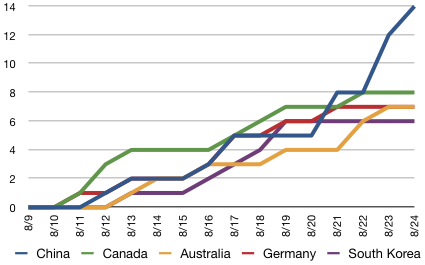
Now for some more visualizations. Google Spreadsheets does heat maps. Here's a heat map of the last-place finishes by country:
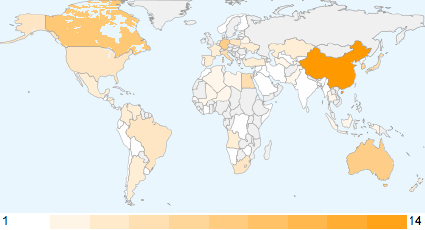
This is an imperfect representation, of course: it doesn't take into account population, GDP or size of athletic delegation, all of which would be useful in evaluating the meaningfulness of a big pile of last-place finishes. Maybe someone can do some math. But the biggest problem is that this map is too darn small. Fortunately, Google Spreadsheets's map widget can zoom in a bit as well.
Africa:
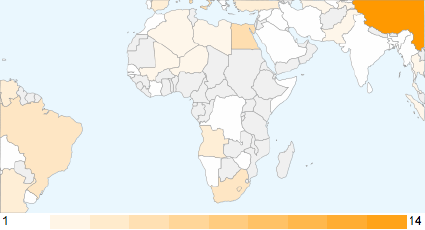
Asia:
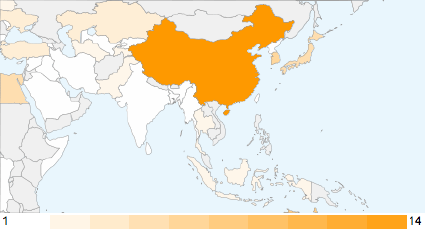
Europe:
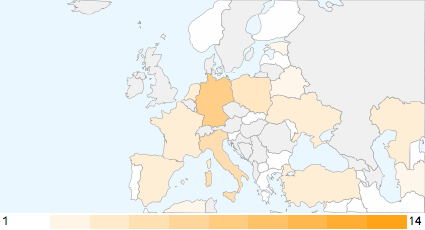
The Middle East:
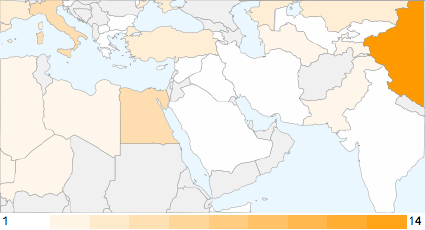
South America:
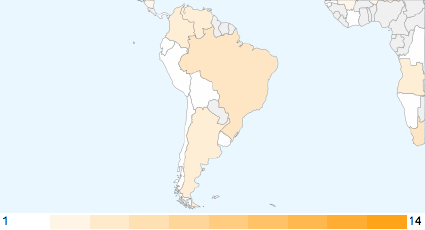
(Something's not right, because Britain should be the same colour as Italy and Japan. Oh well.)
But, as I've said before (2004, 2006), with limited success, none of this actually means anything. Which is precisely my point about the medal race.
1 Sports not covered: badminton, beach volleyball, boxing, fencing, gymnastics (individual events), judo, table tennis, taekwondo, tennis, and wrestling.
First, it means nothing. Despite what I predicted, the DFL race has nothing to do with a country's athletic strength. China may have had more last-place finishes than anyone else, but, with 51 gold medals, they also had more first-place finishes than anyone else.
Which brings me to my second point: large delegations lead the last-place standings. With the top 13 countries having at least four last-place finishes, a country with only three athletes will obviously not crack the top 10. The smallest delegation in the top 10 was Egypt's, with 104 athletes; the smallest in the top 20 was Honduras's, with 28. But the top five were either above 300 athletes or within 20 of that number. Small delegations did have some interesting results, though: São Tomé and Príncipe had three athletes and two DFLs; the Cook Islands, San Marino, the British Virgin Islands and Somalia had a 50 percent DFL rate with only two or three athletes. But, as I argued four years ago, better that these countries send athletes to come in last than not send any athletes at all.
Then there's the African team disadvantage: in team sports with continental qualifiers, there will usually be a spot reserved for Africa, which for any number of reasons is not as competitive. The end result is that countries like Angola, Egypt or Mali just get killed in competitions like basketball, field hockey, water polo, and the relay events in swimming and track -- and that runs up the numbers at the end.
Finally, the most significant factor: the home team disadvantage. It didn't occur in the 2006 Winter Games, but they're different. But in the Summer Games it's as close to an iron law as you can get. Greece got 13 DFLs in 2004, but only one this time around. Their team was also less than one-third the size. China's team, on the other hand, went from six to 14 DFLs, and its team grew by half. This is because the home team gets a berth in every event, including events for which that country would not normally qualify. Because they wouldn't normally qualify, they get clobbered.
China didn't put away the DFL title until this weekend, when it DFLed in men's handball, baseball, the men's 4×400 relay, and two kayaking events. The following graph shows the progression of last-place finishes over the course of the Olympics for the top five countries:

Now for some more visualizations. Google Spreadsheets does heat maps. Here's a heat map of the last-place finishes by country:

This is an imperfect representation, of course: it doesn't take into account population, GDP or size of athletic delegation, all of which would be useful in evaluating the meaningfulness of a big pile of last-place finishes. Maybe someone can do some math. But the biggest problem is that this map is too darn small. Fortunately, Google Spreadsheets's map widget can zoom in a bit as well.
Africa:

Asia:

Europe:

The Middle East:

South America:

(Something's not right, because Britain should be the same colour as Italy and Japan. Oh well.)
But, as I've said before (2004, 2006), with limited success, none of this actually means anything. Which is precisely my point about the medal race.
1 Sports not covered: badminton, beach volleyball, boxing, fencing, gymnastics (individual events), judo, table tennis, taekwondo, tennis, and wrestling.
Labels: analysis, beijing 2008


2 Comments:
At 12:07 PM, August 27, 2008 , simon said...
simon said...
Very cool.
The Google heat maps widget probably doesn't recognize GB, only UK.
We compete under the name Great Britain although it's really the UK (Great Britain + Northern Ireland and some other bits).
At 12:29 PM, August 27, 2008 , mcwetboy said...
mcwetboy said...
I used UK; no idea what's up there.
Post a Comment